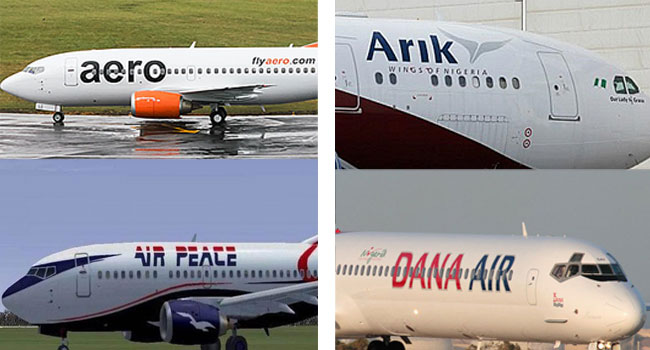Nigerian airline operators have voiced concerns over the diminishing zeal for business continuity amidst escalating aviation fuel costs and a foreign exchange crisis.
This is according to a statement by Obiora Okonkwo, the spokesperson for local air carriers, who emphasized the critical need for governmental intervention to avert the potential downfall of domestic airlines.
Rising fuel cost
The industry is grappling with the challenges posed by the unpredictable fluctuations in foreign exchange rates and the skyrocketing price of aviation fuel, currently priced at N1,300 per litre.
Such economic hurdles have severely hampered the strategic planning and operational stability of the aviation sector.
Highlighting the industry’s plight, Okonkwo, who also presides over United Nigeria Airlines, pointed out the detrimental impact of the abrupt rise in aviation fuel costs from N700 per litre and the exchange rate surge to 1,400/$.
These factors have led to substantial financial losses for carriers. Airlines are now servicing passengers who booked flights at prior rates, at the current elevated costs, thereby exacerbating revenue losses.
FX crisis
The nation’s ongoing struggle with a dollar shortage, exacerbated by diminished oil production – a critical foreign exchange earner – has complicated the ability of local airlines to procure sufficient foreign currency for overseas fleet maintenance and checks.
Okonkwo shed light on the multifaceted challenges confronting the sector, including dollar scarcity and increased operational costs due to hikes in service charges by handling companies, airports, and maintenance service providers.
He lamented the financial strain on passengers, who bear the brunt of these escalated costs, diminishing the airlines’ revenue streams.
Furthermore, Okonkwo noted the adverse effects of the economic downturn on passenger traffic, attributing the decline to reduced discretionary spending among potential travelers, thus impacting the airlines’ ability to maintain viable load factors during the low season.
He said:
- “We are making losses on factors that are beyond our control. We are not only faced with the problem of scarcity of dollars; even the aviation ecosystem is feeling the heat.
- “Handling companies have increased the cost of their services, airports have increased their charges and those that service the aircraft have also increased the cost of their services. The monies for these payments are coming from the passengers who are already exhausted financially.”
Airlines are struggling
The challenges have eroded the airlines’ determination to persist in the business, with some carriers nearing operational shutdown.
Okonkwo emphasized the dire financial straits of the airlines, struggling to meet lease payments with dwindling revenues.
He said:
- “Our passion to remain in this business is being eroded. We are at the point of oxygen supply. Some airlines are going into a coma. Our equipment is diminishing.
- “The minimal revenues we earn to keep the airlines flying, we convert to pay our lessors.”
Okonkwo also touched on the difficulty of expanding fleets under current conditions, citing the apprehension of aircraft lessors towards country-specific risks, which often outweigh the airlines’ compliance with operational standards.
This situation underscores the urgent need for targeted government intervention to stabilize the aviation sector and safeguard its future viability.

Sami Tunji
Sami Tunji is a writer, financial analyst, researcher, and literary enthusiast. Aside from having expertise in various forms of writing (creative, research, and business writing), he is passionate about socio-economic research, financial literacy, and human development. Currently, he is a financial analyst at Nairametrics and an African Liberty Writing Fellow 2023/2024.
Note: This article have been indexed to our site. We do not claim legitimacy, ownership or copyright of any of the content above. To see the article at original source Click Here
















